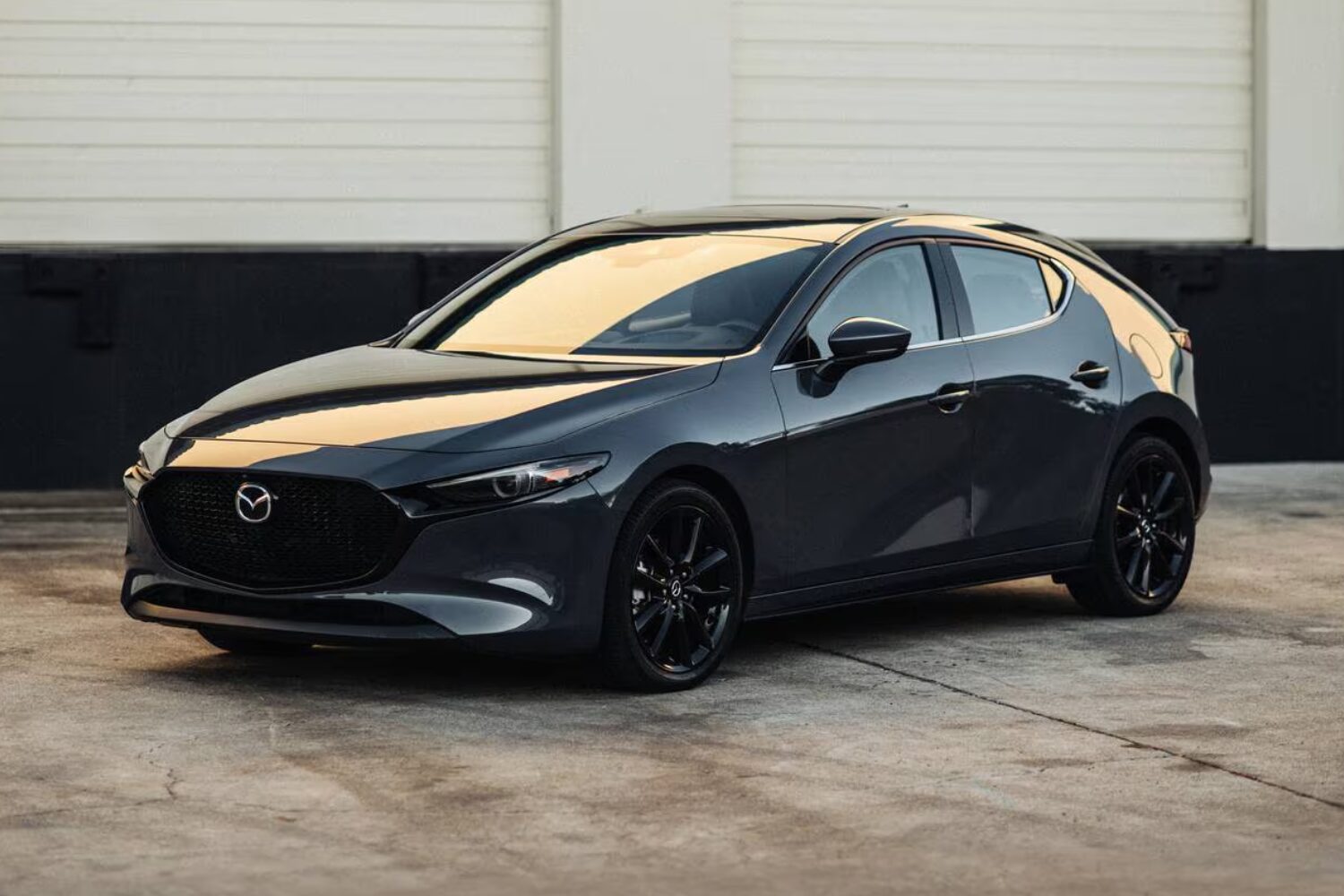
Price: $25,690 - $36,650
7.8 /10
Rating
Pros
- Sporty agile handling dynamics
- Premium interior material quality
- Turbo engine boosts acceleration
Cons
- Firm ride over bumps
- Tight rear passenger space
- Outdated infotainment screen
Overview: 2024 Mazda3 Hatchback
Driving around town, the hatchback immediately stands out with its sporty poise and nimbleness, especially compared to the Honda Civic’s softer setup. The turbocharged 2.5-liter engine delivers eager acceleration, though it lacks the raw edge of rivals like the Hyundai Veloster N. While the six-speed automatic shifts smoothly, enthusiasts might miss a manual option. Personal gripes? The ride feels compliant on smooth roads but turns firm over bumps—noticeable during a weekend drive on rougher backroads.
Inside, the interior impresses with upscale materials rivaling premium-class brands, though the 8.8-inch screen feels dated next to the Acura Integra Type S’s crisp display. Mazda’s infotainment avoids flashy quirkiness, but menu lag had me fumbling mid-drive. Practical wins include intuitive safety notifications and a sound system that balances rumbling bass with clarity. Rear space, however, suffers under the sloped roofline—taller passengers grazed their heads during my test.
Priced above mainstream competitors like the VW Golf, this five-door leans toward stylish design over outright utility. The all-wheel-drive option adds confidence in rain, yet fuel economy trails the Ford Focus’s mild-hybrid efficiency. For daily drivers prioritizing fun-to-drive dynamics and premium aesthetics, it’s a compelling choice—but families might find the Elantra’s rear seats and trunk more forgiving. It’s not a Mazda Miata RF, of course, but it channels some of that sporty flair into a more practical shape.
What's New in the 2024?
Mazda refined the hatchback’s stylish silhouette with sharper LED lighting and a gloss-black grille—a subtle but noticeable upgrade during my evening drive. The interior now offers optional burgundy leather, elevating its premium-class vibe, though the 8.8-inch screen still trails rivals’ larger displays. Tweaked safety alerts now ping less intrusively, a relief after last year’s symphony of beeps. Under the hood, the turbocharged engine carries over, pairing punchy acceleration with a compliant ride—evoking the fun-to-drive agility found in the 2020 MX-5 Miata—until you hit potholes, where the suspension reminds you it’s tuned for fun-to-drive agility, not plushness. New for 2024 is standard all-wheel drive on mid-tier trims, a win for slippery commutes. Fuel economy stays average, missing a chance to adopt a mild-hybrid system like some competitors. The sound system’s bass now feels richer, though it won’t rattle your ribs. Small updates keep it upscale and engaging, but families might still crave the Elantra’s rear legroom or the Civic’s tech-forward cabin.
Pricing, Trim Levels, and Best Choice
Starting at $25,690, the hatchback’s entry-level trim packs LED lights and keyless entry, but skip it if you crave heated seats or a sunroof—the Preferred trim ($27,390) better balances equipment and value. My pick? The Carbon Edition ($32,950) with its alloy wheels and snazzier appearance, though its sticker creeps close to German rivals like the VW Golf. The Premium Plus ($36,650) feels lavish with a 360-degree camera and dual-zone climate control, but at that price, the Mercedes A-Class whispers seductively.
Mazda’s trim strategy shines in mid-tier models: the turbo engine and AWD arrive at $33,000, undercutting the Honda Civic’s fully equipped hybrids. Practical perks? Rain-sensing wipers and power-adjustable seats come standard on upper levels, though the bulbous rear design still hampers visibility. For urban drivers, the entry trim suffices, but spring for the Carbon Edition if you want heated comforts without the Premium’s luxury-tax vibe. If you’re cross-shopping Mazda’s offerings, even the Mazda CX-5 starts to look like a compelling upgrade in terms of space and ride height without sacrificing the brand’s premium feel.
Powertrain, Transmission, and Driving Dynamics
The turbocharged 2.5-liter four-cylinder delivers punchy acceleration, hitting 60 mph (ca. 97 km/h) in a quick 5.6 seconds—enough to surprise passengers during a highway merge. Paired with a six-speed automatic, shifts feel refined but lack the crispness of the Ford Focus’s dual-clutch. While the steering offers well-weighted feedback on twisty roads, the automatic’s reluctance to downshift in corners left me wishing for a manual option. The all-wheel-drive system adds confidence in rain, though the ride firms up over rough surfaces, reminding you this hatchback prioritizes sportiness over plushness. It’s a dynamic balance that feels closer to the Audi A3’s all-weather capability and composed handling, though with a slightly rougher edge.
Mazda’s steering precision shines during lane changes, but the gas pedal’s initial softness requires adjustment. The turbo’s 250-hp peak arrives smoothly, masking its front-wheel-drive bias better than the base 2.0-liter’s weaker 155 hp. While the body control stays composed on uneven backroads, the suspension’s cyclical stiffness might wear on family trips. For daily driving, it’s engaging—just don’t expect the rumble or raw edge of rivals like the Focus ST.
Fuel Efficiency and Driving Range
During a week of mixed driving, the hatchback’s 2.5-liter four-cylinder returned 29 mpg—close to its 26 mpg city/33 mpg highway/29 mpg combined EPA ratings. While respectable, it trails the Toyota Corolla Hybrid’s 50 mpg city/43 mpg highway/47 mpg combined by a wide margin, especially on commutes. The turbocharged engine’s performance punch costs efficiency, dropping to 23 mpg city, 31 mpg highway, and 26 mpg combined. Still, highway cruises at 75 mph proved quieter and nearly as efficient as the BMW 330i’s 34 mpg highway rating.
Mazda’s AWD system doesn’t tank efficiency outright, but the front-drive automatic gearbox model edges it by about 3 mpg more on highways. The Skyactiv-G 2.5-liter naturally aspirated engine remains the standard option, as the e-Skyactiv X engine is not available in the U.S. for the 2025 Mazda3. If fuel economy tops your list, the hybrid Corolla or even Mazda’s front-wheel-drive alternative might tempt you—this hatchback leans into driving joy over pinching pennies.
Premium Interior and Comfort
Opening the door reveals a cabin dressed in premium materials, with soft-touch surfaces covering the dash and doors—a step above the Honda Civic’s functional but plasticky layout. The heated front seats (standard on higher trims) offer adjustable lumbar support, perfect for a four-hour road trip I tackled last month. Yet the rear visibility suffers due to the hatchback’s curvaceous design, making lane changes feel like guessing games. While the Audi A3 trumps it in cargo space, Mazda’s trim-level hierarchy ensures even buyers opting for mid-spec models get luxury interior touches like leather upholstery and a head-up display.
Where it stumble? Lower trims mix expensive-feeling materials with occasional scratchy plastics on door bins, a letdown for compact car shoppers cross-shopping German offerings. The supportive seats and driving position impress, though taller passengers might grumble about knee room. For a family hauling carry-on bags, the trunk works, but the Toyota Corolla’s boxier body style swallows bulkier items easier.
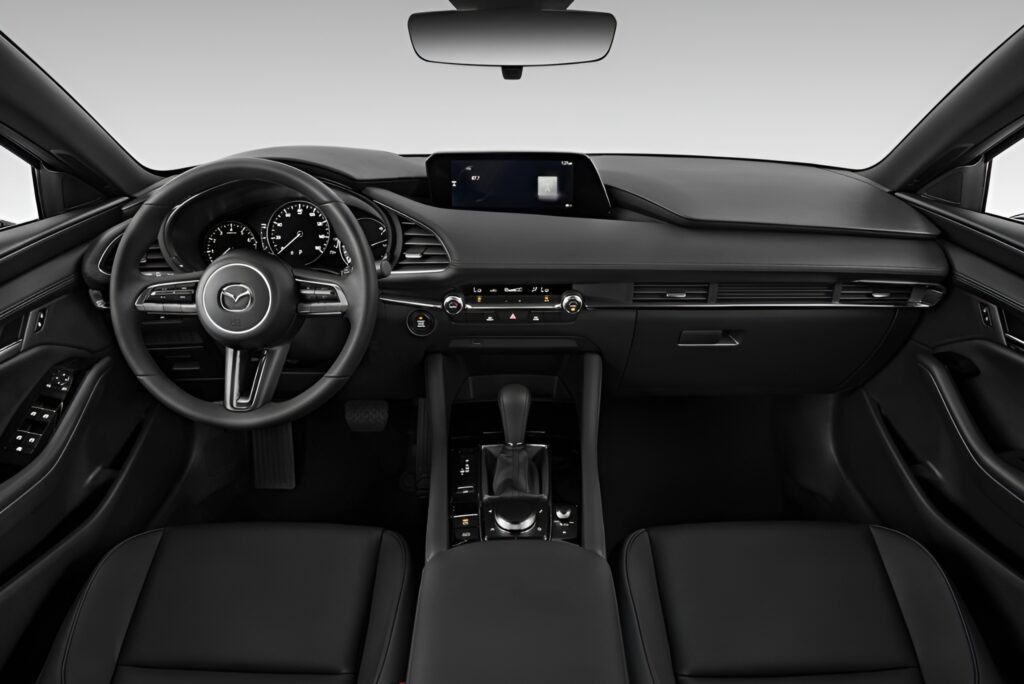
Cargo Space and Practicality
The luggage compartment fits six carry-on suitcases—enough for a weekend trip, though the high load lip makes sliding in heavy items a shoulder workout. Fold the rear bench, and the cargo area stretches to accommodate a bike or flat-pack furniture, but the narrow loading aperture complicates bulkier loads. During a nursery run, installing a rear-facing car seat left front occupants sacrificing knee room, a common gripe in this smaller-than-average segment.
Inside, door pockets and a deep center storage tray handle personal effects, though the tight rear space forces tall rear passengers to duck under the roof. The cargo privacy shield tucks away neatly, but the car seat anchors sit awkwardly behind seatbacks. For urban errands, it’s adaptable—just don’t expect the square shape or ease of rivals like the Honda Civic.
Infotainment, Connectivity, and Smart Tech
Using the console-mounted rotary knob feels intuitive once you adapt—think of it as a high-end stereo dial, not a laptop trackpad. The 8.8-inch display sits low but avoids glare, though its thick bezel looks dated next to rivals’ 10.25-inch screens. Wireless Apple CarPlay and Android Auto connect swiftly, but the absence of a touchscreen frustrates when stationary. During a weekend road trip, the 12-speaker Bose stereo delivered crisp acoustics, though SiriusXM buffering in rural zones tested my patience.
Mazda’s infotainment system avoids flashy menus, but the shortcut buttons’ tiny labels had me squinting at dusk. The wireless phone-charging pad fits larger devices, yet it’s wedged awkwardly under the dash pads. Base trims skip built-in sat-nav and DAB radio, pushing buyers toward Turbo models for extra perks. While the Bluetooth pairs reliably, the system’s constant beeps and bongs for industry-standard alerts feel overcautious—like a backseat driver who’s really into safety.
Safety and Driving Support
Mazda’s safety kit earns top marks, with NHTSA and Euro NCAP awarding five stars for adult occupant safety. The automatic emergency braking intervened smoothly during a sudden slowdown in highway traffic, though the lane-keeping assistance nudged the wheel too aggressively on winding roads. Blind-spot monitoring and rear safety sensors proved reliable, but the traffic alert’s constant beeps near cyclists felt overzealous. While adaptive cruise control handles stop-and-go situations well, disabling it requires digging through menus—a hassle during quick transitions to manual driving.
Key features:
✅ Top-tier crash-test results from major safety agencies.
✅ Pedestrian detection enhances urban driving confidence.
✅ Driver-assistance technology prioritizes caution over customization.
Mazda3 Warranty and Maintenance Plan
Mazda’s basic three-year/36,000-mile warranty lags behind Hyundai and Kia, which offer five-year and seven-year plans, respectively. Its powertrain coverage (five years/60,000 miles) matches Toyota but falls short of brands like Hyundai, which bundles three-year scheduled maintenance. During my dealership visit, the advisor highlighted the single complimentary maintenance session—disappointing compared to rivals’ multi-year perks. While reliability eases long-term concerns, the lack of 100,000-mile protection or extended bumper-to-bumper options feels cautious.
Key features:
✅ Powertrain protection mirrors mainstream segment standards.
✅ No long-term component coverage beyond five years.
✅ Limited free upkeep compared to competitors.
Mazda 3 models
Exploring the lineup, the hatchback offers four trim levels, starting with the base 2.5 S—equipped with a 2.5-liter engine that handles city drives smoothly but lacks the zest of the optional Turbo variant. During a weekend test, the Turbo’s 250 hp transformed highway merges into effortless sprints, though fuel economy dipped noticeably. Mid-tier trims add all-wheel drive, a practical choice for wet climates, while top specs bundle features like heated seats and a premium sound system. Compared to the sedan, the hatchback trades rear headroom for cargo flexibility, but both share the same sharp equipment list, including standard Apple CarPlay and adaptive cruise control.
| Trim Level | Features |
|---|---|
| Mazda 3 2.5 S (Sedan Only) |
|
| 2.5 S Select Sport |
|
| 2.5 S Preferred |
|
| 2.5 S Carbon Edition |
|
| 2.5 S Premium (Hatchback Only) |
|
| Mazda 3 2.5 Carbon Turbo |
|
| 2.5 Turbo Premium Plus |
|
Gallery:
Images sourced from News.Mazda USA


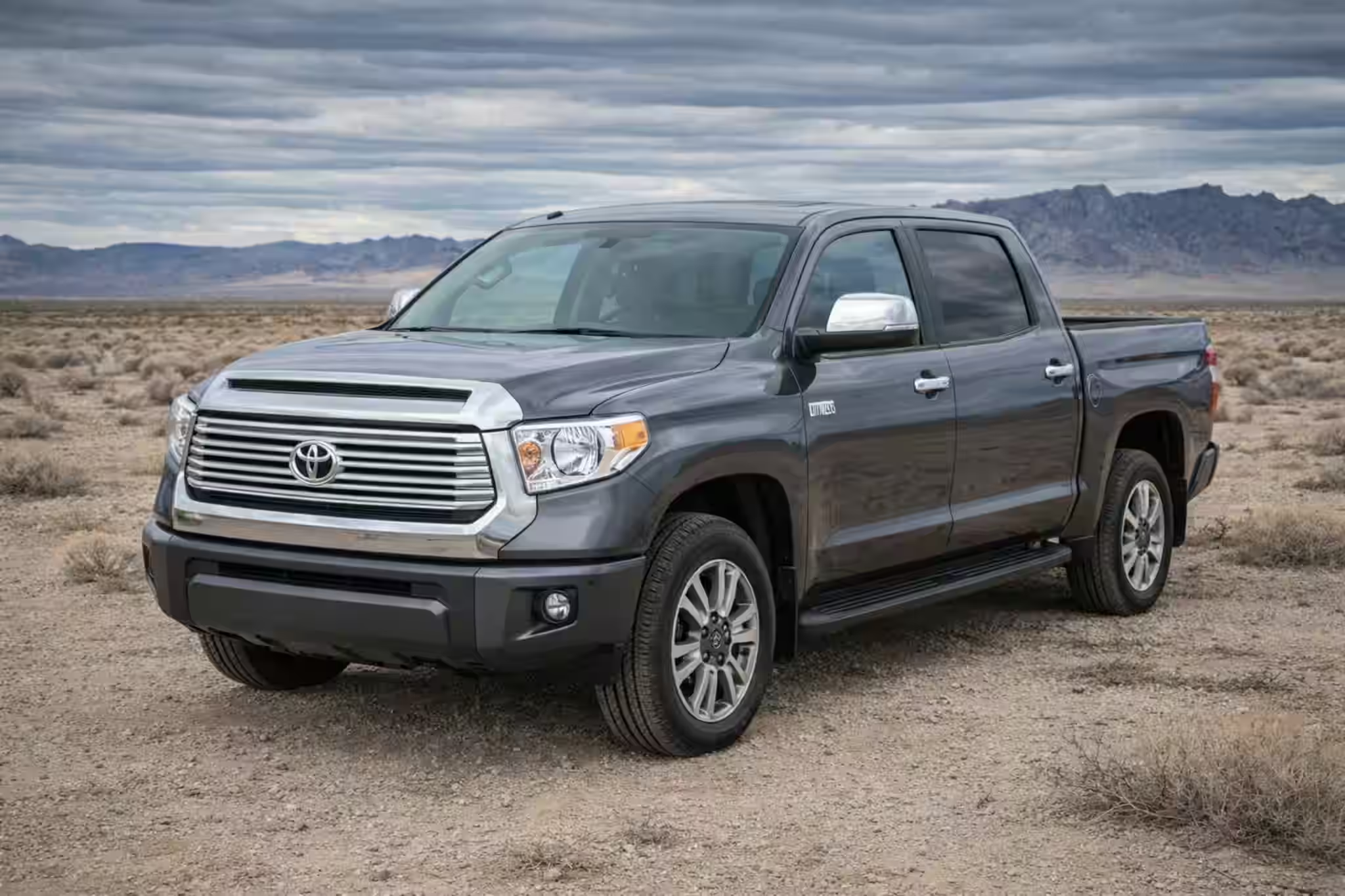
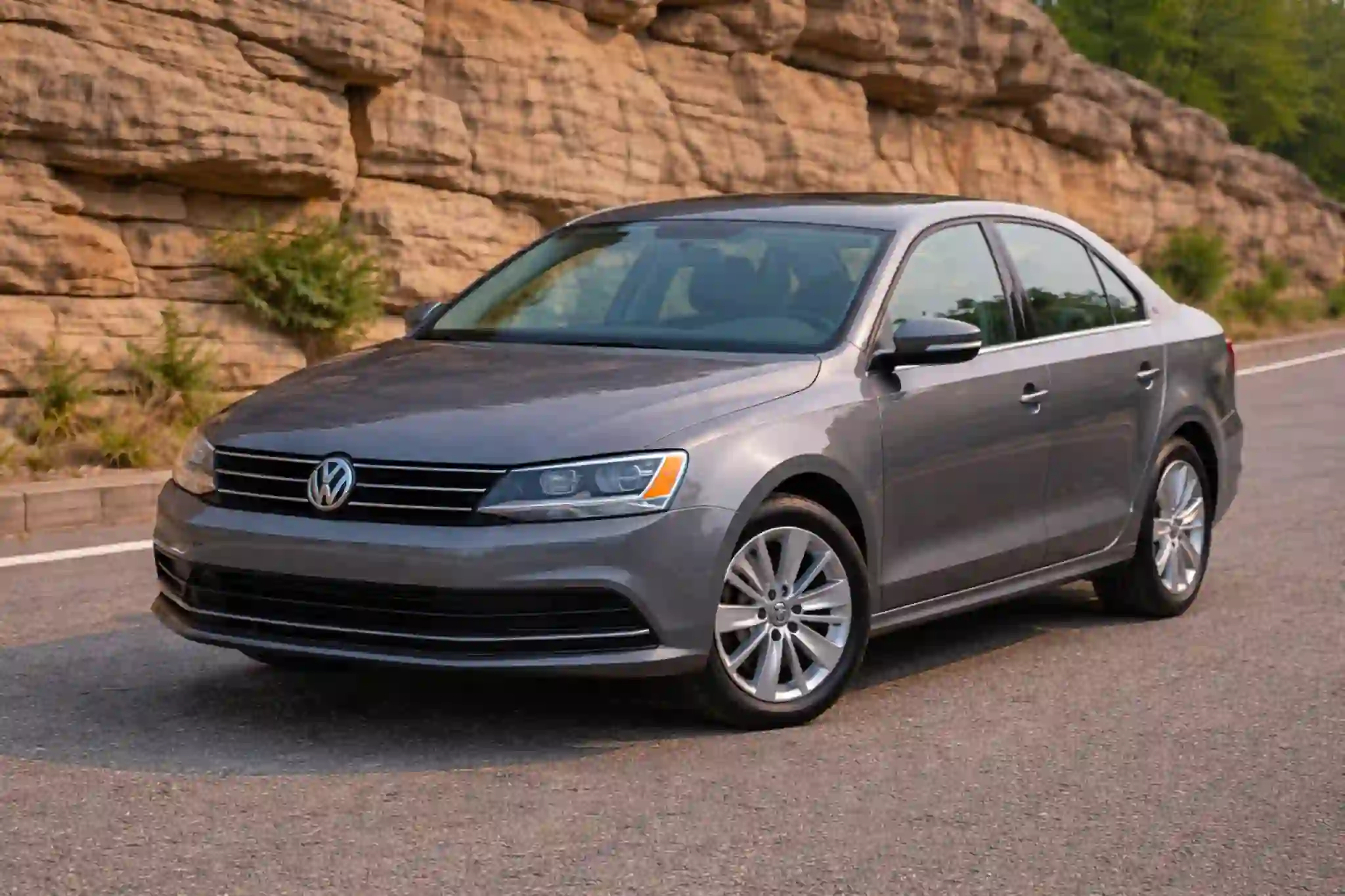
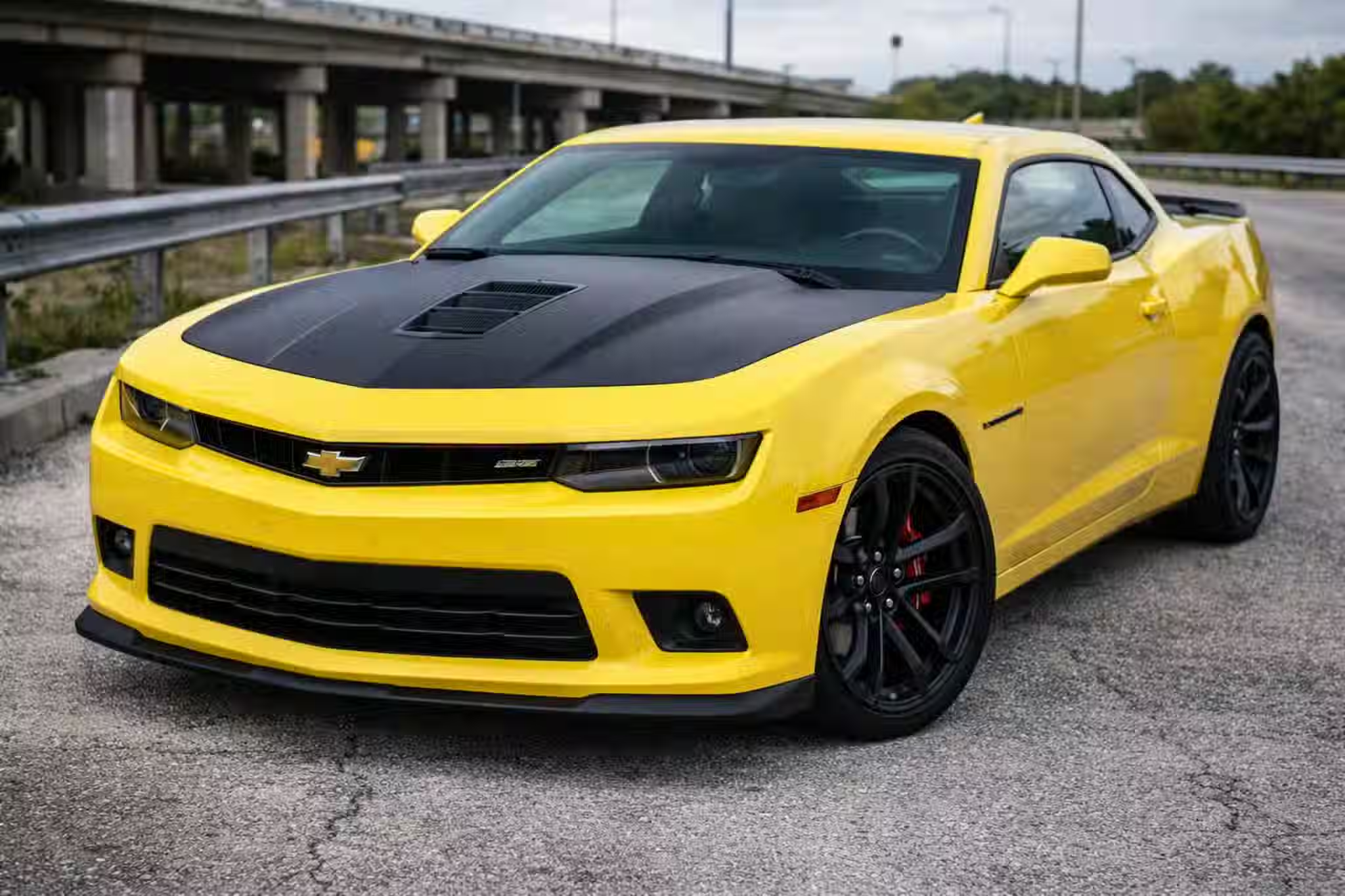
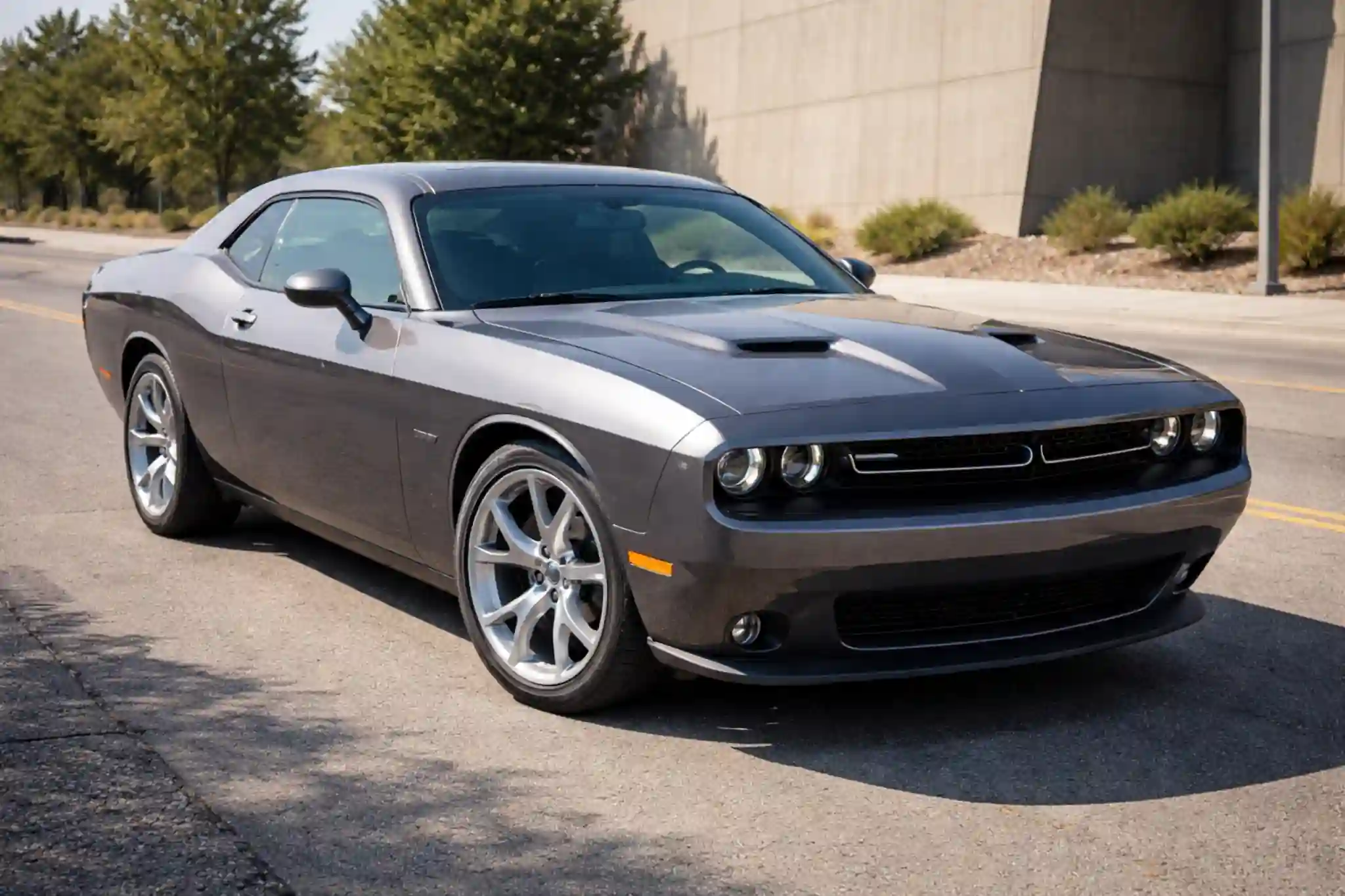
This Post Has 14 Comments
The Mazda3 Hatchback is a thrilling drive, with its agile handling and potent engine making it a joy to navigate twisty roads. Its premium interior and sleek design also make it a standout in its class.
Pingback: 2020 Honda Civic Si Review: Performance & Driving Thrills
Pingback: Review: 2021 Mazda CX-30 Thrilling Yet Flawed
Pingback: 2025 Honda Civic Hybrid Review: Efficiency That Excites
Pingback: 2021 Mazda 6 Review: Luxury Feel, Sporty Drive
Pingback: 2020 MX-5 Miata RF Club Review & Buying Guide
Pingback: 2025 Volkswagen Jetta 1.5T Sport Review & Updates
Pingback: 2024 Toyota Corolla Hybrid SE Nightshade review
Pingback: 2024 Elantra N DCT Review: Built to Thrill Daily
Pingback: 2021 Hyundai Veloster N: The Ultimate Thrill Steal? Read & Decide!
This is really interesting, You’re a very skilled blogger.
I have joined your feed and look forward to seeking more of your fantastic post.
Also, I’ve shared your website in my social networks!
Pretty nice post. I just stumbled upon your
blog and wished to say that I’ve truly enjoyed browsing your blog
posts. After all I’ll be subscribing to your feed and I
hope you write again soon!
Hi my friend! I want to say that this post is awesome, nice written and
come with approximately all vital infos. I’d
like to see extra posts like this .
Pingback: 2017 Kia Soul Review: More Than a Box on Wheels